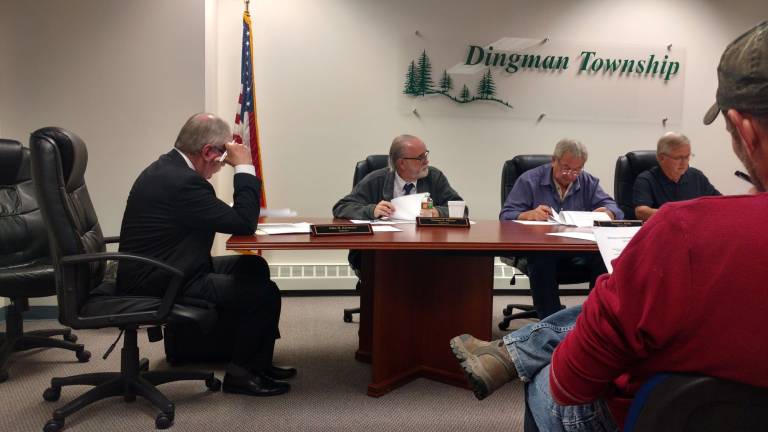Posting agendas a burden, Dingman officials say

By Anya Tikka
DINGMAN TOWNSHIP — Many members of the public appreciate knowing ahead of time what business their municipal board will take up at a meeting.
But the Dingman supervisors said a proposed law that would require municipalities to post agendas on their website at least 24 hours ahead of a meeting, including all contracts and expenditures, would be a drag on the township.
At a recent meeting, Dingman solicitor John Klemeyer and clerk/treasurer Karen Kleist briefly recounted the upcoming vote on Pennsylvania House Bill 1155.
The proposed law would prevent action on any item not included in the advertised agenda "unless it’s a matter that arises in a situation in the meeting," Kleist said. Anyone with an emergency would, it seems, have to come to the meeting, she said.
She said the law is a bad idea, and logistically difficult.
Supervisors Chair Tom Mincer agreed.
“I think it asks too much, for things that are expenditures and contracts, but it’s the other issues that I worry about," Mincer said. "We have a lot of people who call us on the day of the meeting.”
The Pennsylvania Sunshine Act requires municipalities to conduct business in public meetings announced ahead of time. But they don't have to state publicly the purpose of their meetings.
Could a sub-division or land development ready at the last minute be considered? Kleist wondered.
“It depends," said Klemeyer. "Sometimes we don’t get the reports from the engineers until the day of the meeting. What are we supposed to do? Put if off for a month?”
Mincer said he understands the importance of making contracts and expenditures public.
“We want people to know," he said.
But, he said, many situations affect only individuals and not the wider community.
Klemeyer suggested a simple solution to stay on the right side of the law, should it pass: list everything that could possibly come up at a meeting on a four-page agenda.
Supervisors were dubious. But Klemeyer came back with, “When you come up with a ridiculous legislation, sometimes you have to go to lengths to comply with it.”
Kleist said getting the agendas online pose a problem: If the person designated to do the job were out on a Monday, "that means we couldn’t have a meeting."
What's behind it?
Klemeyer wondered what was behind the proposed new law.“It would really be nice if they told us what problems they are trying to solve," he said. "Give us a history of this happened here, this happened there, and because of that, we’re coming up with this.”
PA Rep. Jim Christiana (R-Beaver/Washington), who authored the bill, said he wanted to "raise the bar of transparency and accountability at all levels of government."
“All government officials have a responsibility to conduct the taxpayers’ business openly and transparently,” Christiana says on his website. “Our school districts, along with state and local governments, are spending billions of taxpayer dollars every year. It’s unacceptable to not have a public agenda in place at least 24 hours in advance.”
Christiana said he'd heard from multiple citizens and members of the media who felt deliberately left out of government decisions or believed some elected officials operated within gray areas.
“There have been cases in which some have manipulated the rules or used a weak agenda to hide controversial decisions from the public and the media,” Christiana said.
Klemeyer said the issues that generate the most interest locally are not signed contracts but other matters not required on the agenda.
Kleist said she thought bills would have to be included. At the moment, the totals are included on agendas but not the itemized bills.
Mincer said the supervisors just don’t know much yet about the proposed law.
"We’ve not seen a copy yet, we’re just hearing comments," he said. "So we don’t know much about it."